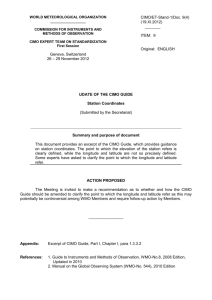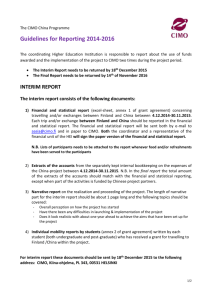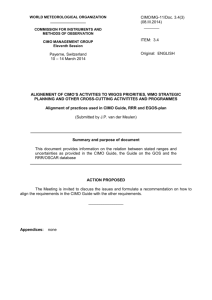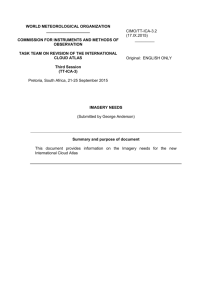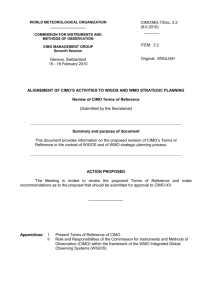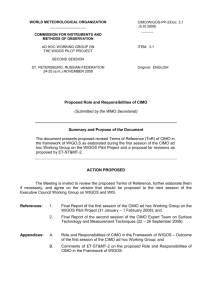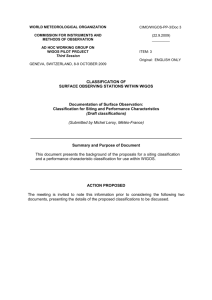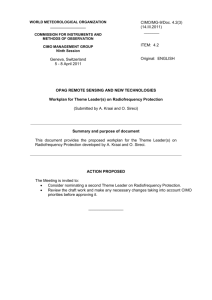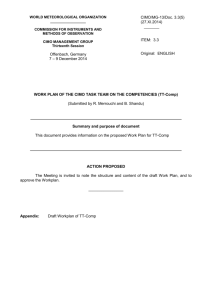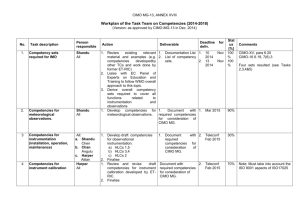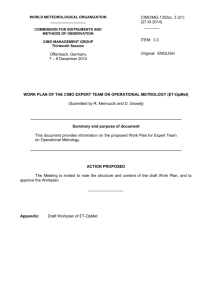Comments on ATD operation for July /August
advertisement
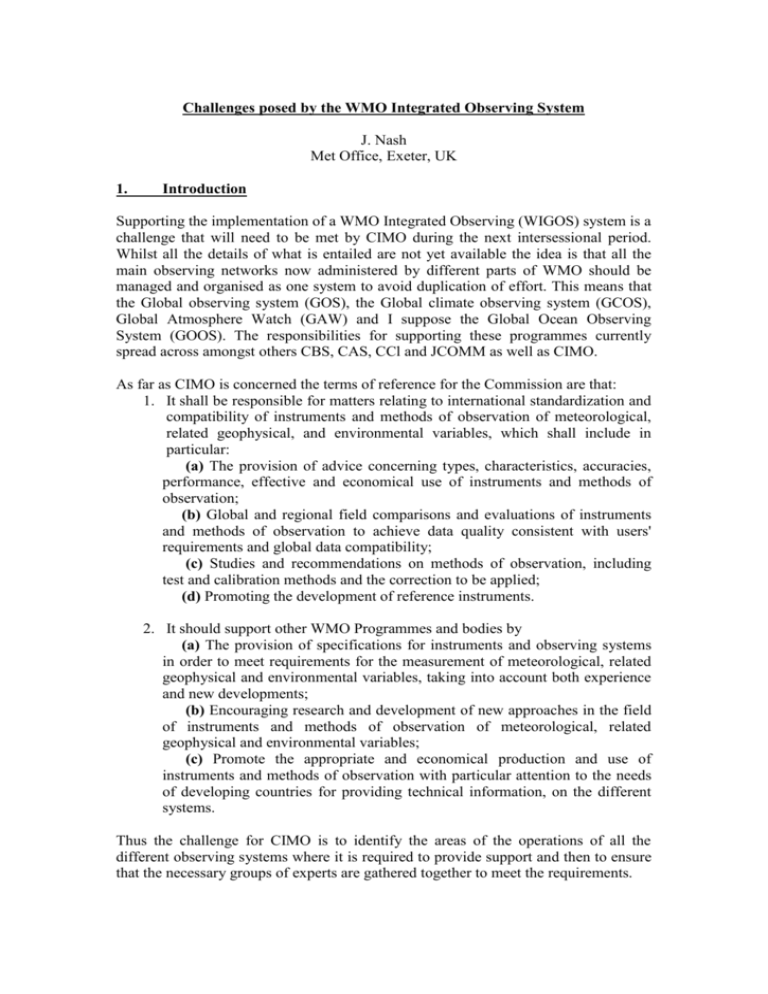
Challenges posed by the WMO Integrated Observing System J. Nash Met Office, Exeter, UK 1. Introduction Supporting the implementation of a WMO Integrated Observing (WIGOS) system is a challenge that will need to be met by CIMO during the next intersessional period. Whilst all the details of what is entailed are not yet available the idea is that all the main observing networks now administered by different parts of WMO should be managed and organised as one system to avoid duplication of effort. This means that the Global observing system (GOS), the Global climate observing system (GCOS), Global Atmosphere Watch (GAW) and I suppose the Global Ocean Observing System (GOOS). The responsibilities for supporting these programmes currently spread across amongst others CBS, CAS, CCl and JCOMM as well as CIMO. As far as CIMO is concerned the terms of reference for the Commission are that: 1. It shall be responsible for matters relating to international standardization and compatibility of instruments and methods of observation of meteorological, related geophysical, and environmental variables, which shall include in particular: (a) The provision of advice concerning types, characteristics, accuracies, performance, effective and economical use of instruments and methods of observation; (b) Global and regional field comparisons and evaluations of instruments and methods of observation to achieve data quality consistent with users' requirements and global data compatibility; (c) Studies and recommendations on methods of observation, including test and calibration methods and the correction to be applied; (d) Promoting the development of reference instruments. 2. It should support other WMO Programmes and bodies by (a) The provision of specifications for instruments and observing systems in order to meet requirements for the measurement of meteorological, related geophysical and environmental variables, taking into account both experience and new developments; (b) Encouraging research and development of new approaches in the field of instruments and methods of observation of meteorological, related geophysical and environmental variables; (c) Promote the appropriate and economical production and use of instruments and methods of observation with particular attention to the needs of developing countries for providing technical information, on the different systems. Thus the challenge for CIMO is to identify the areas of the operations of all the different observing systems where it is required to provide support and then to ensure that the necessary groups of experts are gathered together to meet the requirements. 2. Examples for Upper air measurements In order to illustrate the possible challenges it is easier for me to deal with the area of upper air measurements as an example. Here, it will be necessary to support national network operations which to a large extent supports the GOS functions, then to support the GCOS Upper Air Network (GUAN) operations for the climate community, and possible GCOS Reference Upper Air Network( GRUAN) stations and then also GAW upper air measurements such as ozonesonde operations. At the moment CIMO probably performs terms of reference 1 (a) to (c), and 2(a) quite well for GOS and GCOS operations, but there appears to be some feeling among customer commissions that it is not supporting 1(d) or 2 (b) very actively and 2(c) has yet to be successfully achieved. It is also felt in practice the quality of radiosonde observations throughout the GOS is not good enough in several regions and that the operation of the GUAN falls short of expectations Traditionally CIMO seems to have assumed responsibility for trying to address this. There has been progress in routine operational measurements in many regions and also significant investment in the GUAN, implemented by CIMO representatives. However, problems still remain that have been apparent for far more than the last decade, some of these even in the networks of countries with large economic resources. In order to satisfy the climate community requirements it seems essential to eliminate the regions of substandard measurements as soon as possible. This will probably require significant bi-lateral effort and ideally it should be supervised by a task team of one of the Expert teams. Up till now the only task teams that have been truly successful for CIMO in recent years have been those targeted on intercomparisons and also some teams targeted on training activities and capacity building. The challenge is to target the operational problems and can only be achieved if the countries concerned are willing to co-operate. Thus any activity must be seen as a cooperative programme and not a programme implemented on an unwilling customer. One of the problems in the regions concerned is a lack of training material for scientists involved in rectifying the problems. CIMO needs to address this issue and to make sure that its training and reference materials are suitable for use by the whole range of staff involved in addressing the problems , i.e. radiosonde operators, operational managers and scientists brought into solve the problems from other skill areas. Also, in many countries the challenge is to allow the staff who really need the training to have access to suitable task teams, rather than sending managers who cannot benefit from the scientific and technical exchanges at the meeting. With regards to supporting GUAN operations, it is clear that there are very few experts left with suitable skills that can be sent to a country and implement the necessary remedial actions... So it would seem wise for CIMO to identify and encourage those experts that are able to do this work. This may mean that some work is done by specific experts nominated by the CIMO Management Committee and authorised by the WMO Secretariat to perform specific tasks. In this context, CIMO needs to identify what the requirements for this type of support are likely to be in future so that the necessary arrangements can be made to retain the expertise. When it comes to supporting GRUAN and GAW operations it is clear that CIMO needs to improve its relationships with the scientific community involved in developing new types of observing systems. Thus, materials must be produced that are useful and relevant to the scientific community, results from CIMO tests have to be published in a way that is acceptable to the scientific community. It is essential that the work of CIMO is recognised to be of excellent quality and not ignored by certain areas of scientific development. Work is required to develop material that allows staff associated with more routine operations to manage some of the more sophisticated observing systems and hence ensure good continuity of necessary measurements on a wider scale than is currently possible. Improved collaboration with the remote sensing community is also desirable as the requirement for more detailed upper air observations in space and time lead to an increasing interdependence between upper air observing systems such as wind profilers and GPS water vapour, weather radar measurements and aircraft measurements, as well as radiosonde systems. CIMO needs to be clear as to the targets set for upper air remote sensing and it is essential that CIMO starts to provide suitable support to weather radar operations. Here, the Commission needs to be challenged to develop a meaningful programme that will benefit not only the developed countries but also those investing in these systems from countries with less economic resources. 3. Conclusions It is clear that the WMO Integrated Observing System will lead to new demands on CIMO and also some impetus for CIMO to address all its terms of reference and not only those that it finds easy to address. It is important that CIMO builds links with the scientific community supporting the development of new observing systems, and in the case of systems that already exist such as weather radar, where CIMO activity up to now has been intermittent. In some cases this may also be achieved through regional collaborative activities, such as proposed COST projects in Europe. In achieving success for such proposed projects it is clearly necessary to gain a widespread support within a region such as Europe, so it will be necessary for more active collaboration between CIMO members in ensuring that the work is facilitated. Some very difficult tasks remain to be addressed, which require more concentrated effort by CIMO management and also a willingness to collaborate by some of the countries involved. Here, CIMO clearly needs to demonstrate that it can offer useful support and that it is provided in a sensitive fashion so that it encourages the experts in the countries involved. CIMO needs to ensure that it has the necessary range of well-qualified experts to satisfy the likely increase in requests for support that will come with WIGOS.
